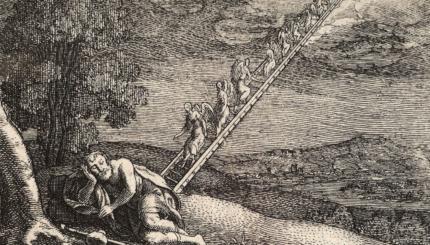Commentary on Parashat Vayetzei, Genesis 28:10-32:3
“Jacob came to the place.” (Genesis 28:11)
What does “the place” (hamakom in Hebrew) refer to above? This is the spot where Jacob falls asleep and sees a ladder, with angels going up and down. This is the “place” where God continues the biblical covenant with Jacob, the covenant of his fathers, Abraham and Isaac.
Sounds like a pretty important place! Normally, when a location is important —whether in the Torah or in our own lives — we remember what it is called, or we give it a special name that honors our experience there. Why then, does the Torah, which does not shy away from naming specific locations, refer to this holy and important location merely as “the place”?
Biblical commentaries offer many possible answers. Daat Zekeinim (an anthology of medieval commentaries first published in the 18th century) say that “the place” refers to a location that was known for being a prayer spot. The rabbis explain that one of God’s names is “Hamakom,” so it is fitting to refer to this location as “the place” because at it Jacob encountered “The Place.” Seforno (a 15th-16th-century Italian commentator) says the term refers to a traveler’s lodge for those passing along the way. Jacob was a traveler, and so it made sense for him to stop there to rest. The text is vague about exactly where the lodge was in order to underscore that the location was not important, rather Jacob’s encounter with God there is what we should focus on.
But Bechor Shor (a 12th-century French commentator) offers an answer that looks beyond the location entirely. He suggests that “the place” refers not to a place but to anything that occurs without having been planned ahead of time. In this interpretation, “the place” refers not to an actual location but to an experience — the experience of happenstance. Jacob has no intention of stopping to rest at that spot. He was on his way, he happened upon it and he spontaneously rested.
Often the holiest and most meaningful moments are those that just happen — an unplanned moment of rest with our family, an unexpected deep conversation with a friend or an overwhelming feeling of gratitude to God that we never could have forced. The experiences or encounters that we don’t plan but that occur naturally and easily, and yet forever impact us. By emphasizing the importance of this kind of moment, our Torah text is highlighting this universal experience and challenging us to cultivate sensitivity to the mundane, overlooked moments we stumble upon that may actually end up being the most powerful of our lives.
Upon waking, Jacob gets up and exclaims, “God was in this place, and I did not know it!” (Genesis 28:16) Jacob could have overlooked his experience — maybe it was just a nice dream? But one of the many traits that makes Jacob a timeless role model for us is his ability to notice the things that most people would overlook. He sees God’s hand in his life, even in the small and mundane experiences, and he is grateful for them.
Jacob’s appreciation challenges us to ask ourselves if we would do the same. Do we stop and look for the meaning in ordinary conversations, in day-to-day activities, in moments of rest? Do we look for God’s hand in our lives? Are we sensitive to “the place,” the transformative experiences and relationships that we can stumble upon at any moment?
Jacob shows us that being a Jew, being in covenant with God, means cultivating the capacity to see The Place in the place, seeing that which is mundane as a window into holiness. May we, like Jacob, recognize God’s presence and guidance in our lives, and may we be open to the things we don’t intend to happen being the experiences we cherish most.

Help us keep Jewish knowledge accessible to millions of people around the world.
Your donation to My Jewish Learning fuels endless journeys of Jewish discovery. With your help, My Jewish Learning can continue to provide nonstop opportunities for learning, connection and growth.



